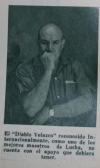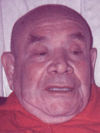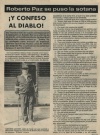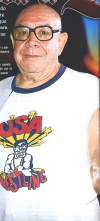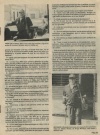Diablo Velazco: Difference between revisions
m (→Gallery) |
|||
| Line 3: | Line 3: | ||
{{bioFields| | {{bioFields| | ||
|image= | |image=Diablo Velazco Box y Lucha.jpg | ||
|name="Diablo" Velazco | |name="Diablo" Velazco | ||
|realName=Cuauhtémoc Velazco Vargas | |realName=Cuauhtémoc Velazco Vargas | ||
Revision as of 10:43, 8 July 2020
Profile
| "Diablo" Velazco | |||||||||||||||||||||||||||||
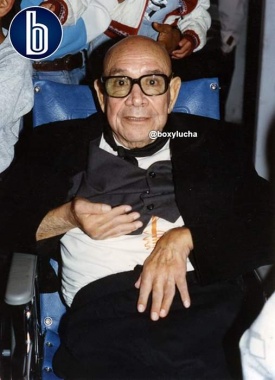 |
|
||||||||||||||||||||||||||||
| Wrestling Observer Hall Of Fame Member |
|---|
Biography
Velazco watched his first wrestling match in 1934 and he was so impressed by it that he decided to become a wrestler. Raúl Romero took him under his wing in 1935, and after two years of amateur wrestling training Velazco made his professional debut on 1937, as Telmo Velazco. His first payoff was a bottle of Coca Cola! He worked hard and got to wrestle in Mexico City for Salvador Lutteroth, but he was very small and he mostly worked as a preliminary wrestler.
In all reality, there's not much more to say about the career of Velazco as a professional wrestler. So what makes this man so special and why is he considered a legend?
In 1942, Velazco started a career as a wrestling trainer in Guadalajara, Jalisco in a local "Box y Lucha" gym, and a few years later, on June 20, 1959, he became the head trainer at the gym located at the newly created Arena Coliseo de Guadalajara. He also became a referee in the same arena.
Little did he know that after he retired, the list of the wrestlers he trained would be the longest and most illustrious of any trainer ever in the story of professional wrestling all over the world. And in all reality, this list most likely will never be topped.
Among those who were trained by Velazco were Atlantis, Alfonso, Apolo and César Dantés, Emilio Charles Sr. and Jr., El Dandy, Irma Aguilar and Irma González, Ringo and Cachorro Mendoza, Satánico, Perro Aguayo, Cavernario Galindo, Angel Blanco Sr. and Jr., Los Hermanos Dinamita (Cien Caras, Máscara Año 2000, Universo 2000), Tarzán López, Javier "Monarca" Cruz, Javier "Américo" Rocca, Gran Markus Jr., Bestia Salvaje, Corazón Salvaje, Mosco de la Merced, Zorro, Solar I & II, Rayo de Jalisco Sr. & Jr., Valentín Mayo, Arkángel de la Muerte, Oro, Plata, El Piloto Suicida, Rito Romero, Hiro Matsuda, Mano Negra, Black Man, Black Terry (Guerrero Maya), El Texano, El Gladiador, El Hijo del Gladiador, Bobby Bonales, Rolando Vera, Gory Guerrero, Alberto Muñoz (White Man), Pepe Vargas, Vic Amezcua, Tony Salazar (Ulises), Enrique Vera, Franco Colombo, Sangre India, Águila India, Gran Cochisse (Espectro de Ultratumba), Espectro Jr., El Supremo I, César Curiel, El Solitario, Mil Máscaras, Abismo Negro and his last major trainées, Shocker and Mr. Águila.
Basically almost anybody that was born in Guadalajara, or started his lucha libre career there, was trained by Velazco. Diablo's school had such a reputation that guys from everywhere would move to Guadalajara just to get trained by the man himself.
Velazco was never much of a figure that would make a lot of special appearances but on October 19, 1983, he participated in an special "exhibition" match against his former student Gran Cochisse at the Arena Coliseo de Guadalajara in front of in excess of 6,000 fans. Velazco's last public appearance in the capital was at a ceremony honoring lucha legends held January 24, 1992, at Arena Coliseo.
He stopped training wrestlers in 1997 when a terminal heart disease began to debilitate him. Over the last year of his life he was in a wheelchair, this was also due to the fact that in 1986 he suffered a hip injury which required extensive surgery.
Cuauhtémoc Velazco passed away on Sunday, June 13, 1999 in his hometown of Guadalajara, Jalisco, after suffering a heart attack. The papers said that he was 75, but I have also seen him listed as being born in 1919.
Following Mexican tradition of burying people within 24 hours of their death, a funeral service was held the following day at the La Colonia funeral home in the Los Arcos section of the town.
A week later (June 20) it was the 40th anniversary of the Arena Coliseo (the Guadalajara one) and the card was a Velazco Memorial show.
To quote "Dr. Lucha" Steve Sims, Velazco is arguably one of the 10 most influential people in the entire history of lucha libre and un-arguably one of the top 20. He's the most famous trainer ever in lucha libre and a man that gave everything he had to lucha. He always had such a big reputation as a trainer but he never was in it for the money, as he'd firmly refuse to train any wrestlers without any knowledge of amateur wrestling because he wasn't there to make "stars", he was there to make "wrestlers". Though in the end, the quality of many of those Velazco-trained wrestlers made them stars.
Gallery
